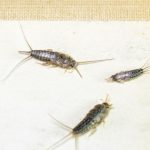STORED GRAIN PEST
Farms, industries, and households in Missouri need protection from insects and pests. Stored grain insects, such as weevils, beetles, and moths, can damage your grain or food supply, reducing the grain’s quality and leading to significant financial losses on farms. If left unchecked, they can also contaminate food supplies and spread disease. At Titan Pest and Wildlife Solutions KC, we understand the challenges that stored grain pests bring. Our professional pest control team specializes in grain pest extermination, ensuring your stored grains remain safe and secure.
Grain Protectant Solutions and Top-Dress Treatments | Pest Control and Management of Stored Grain Pests in Missouri
Serving Missouri with dedication, we provide expert solutions tailored to your specific pest control needs. Trust Titan Pest and Wildlife Solutions KC, your stored grain pest experts, to protect your investments and maintain the integrity of your grain storage or in-home food supply.
Types of Common Grain Pests in Missouri
Grain beetles, such as the rice weevil and flour beetle, are common pests in grain storage areas. These beetles can quickly multiply and spread throughout your stored grains, causing extensive damage.
Red flour beetles are another common pest that attacks stored grains. They can survive in dry conditions, making them a persistent problem in grain storage.
Lesser grain borers have developed resistance to several insecticides, which makes them especially difficult to control. This is why professional extermination is often necessary.
Weevils, like the rice weevil and granary weevil, are notorious for infesting stored grains.
Rice weevils, very common in Missouri, can lay up to 450 eggs in the holes they chew in cereal grains. Each egg hatches into white, legless larvae that feed on the grain from the inside, causing significant damage.
Granary weevils typically move with stored agricultural grains and are known to damage both commercial and home-stored grain supplies.
Moths, particularly Indian meal moths and flour moths, are major pests in grain storage.
Indian meal moth larvae are attracted to coarser flour grades, such as whole wheat or graham flour, causing them to infest stored grain products.
Flour moths, a common pantry pest, damage stored food products when in the caterpillar stage. These moths can ruin grains, flour, and other pantry items.
Rats and mice are notorious for infesting grain storage areas. They not only consume large quantities of grain but also leave behind droppings and urine, which can contaminate your food supply.
Besides beetles, weevils, moths, and rodents, other pests like ants and spiders can also affect stored grains. Ants can invade storage areas in search of food, while spiders may build webs to catch other insects.
Why are Stored Grain Pests, Especially Insects, a Problem?
Stored grain pests pose several risks to your property and health. Here’s why they are a serious concern:
Pests can destroy large amounts of stored grains, leading to significant financial losses. They eat and contaminate the grains, making them unsafe for consumption.
Pests like rodents and insects leave behind droppings and urine and shed skin. This contamination can make your grains unsafe to use, resulting in wasted inventory supplies and increased costs.
Contaminated grains can pose health risks to consumers. Ingesting contaminated food can lead to illnesses and allergic reactions, especially for those with sensitivities to pests.
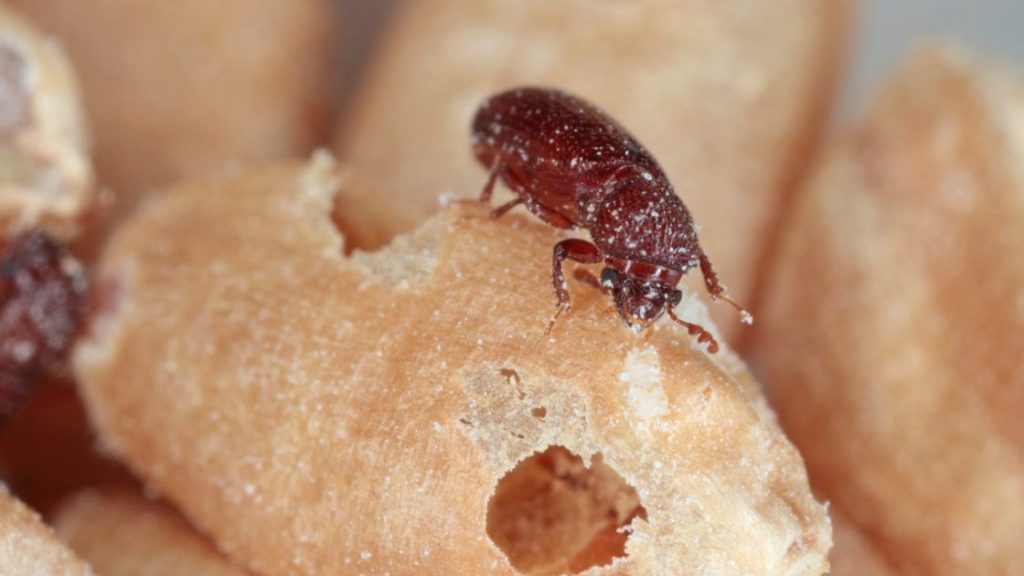
Signs of Stored Grain Pest Infestation: When It's Time to Apply an Insecticide as a Grain Protectant
Early detection of pest infestations can save you time and money. Here are the signs to watch out for:
Rodents leave behind gnaw marks on packaging and storage containers. These marks indicate their presence and potential for further damage.
Pests produce strong, unpleasant odors from their droppings and urine. An unusual smell in your storage area may indicate a hidden pest problem.
Droppings from rodents and insects are a common sign of infestation. Again, these droppings can contaminate your grains and spread diseases.
Pests often shred packaging and storage materials to create nests. Finding shredded material around your stored grains suggests an active infestation.
Pests can cause grains to spoil quickly. Spoiled grains lose their nutritional value and become unfit for consumption.
Pests like beetles and rodents often create small holes in grain packaging. These holes allow them to access and infest the grains inside.
Seeing insects moving around your storage area is a clear sign of an infestation. These pests can quickly spread and multiply if not addressed promptly.
Infested grains may change color due to pest activity. Discoloration is a sign that the grains are compromised and unsafe for use.
Pests like beetles and moths lay eggs in grains, leading to an infestation from within. This hidden damage makes it difficult to control the problem without professional help.
Applying Top-Dress Treatments and Using a Safe Grain Protectant for Stored Grain Pest Control
At Titan Pest and Wildlife Solutions KC, we apply a grain protectant in the form of top-dress treatments to the grain surface of the grain mass. This control measure eradicates and prevents insect damage and preserves the quality of the stored product.
Our safe solutions, when applied as top-dress treatments, disrupt the development of immature insects and larvae, such as the Indian meal moth. Grain protectants are applied to the grain’s surface, added to bin walls, or inserted into the grain safely and effectively. By means of insect identification, we can use the best treatment approach for grain stored in a bin or cereal products in your pantry or home.
As a preventative measure, we may apply insecticide to an empty grain bin about two weeks before grain storage. We pay attention to the areas insects like to hide – beneath false floors and inside of vents. An infestation might also reveal itself around cracks around doors or vents.
Getting Rid of In-Home Pantry and Grain Pests: The Sawtoothed Beetle
We can also help you eradicate a problem when an infestation occurs in your home. For example, the sawtoothed grain beetle may be found in unopened foods. The small and flat beetles are dark red or brown in color and only about 1/10″ long. They get their name from having saw-like teeth on each side of their body.
Sawtoothed beetles feast on dry goods, nuts, seeds, grain, dried fruits, dried meats, and candy after penetrating the packaged foods. They lay shiny white eggs in the small crevices of food materials. They travel inside homes in infested products from grocery stores and can easily enter sealed cardboard boxes or soft plastic packaging materials.
In this instance, we may use a residual insecticide that lasts for several weeks at a time.
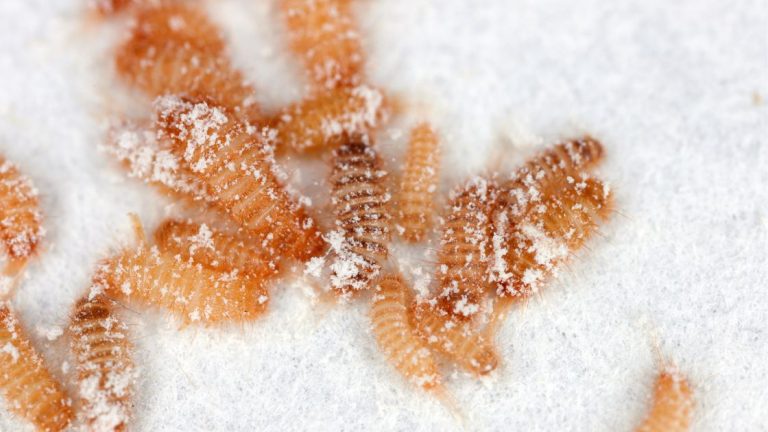
Getting Rid of the Insect, the Angoumois Grain Moth, in the Home
If you have a problem with Angoumois grain moths, we recommend you discard any infested food, and we’ll use insecticides labeled safe for this type of home use. We can also get rid of an in-home insect problem safely by using plastic tube traps. We may also use these traps to monitor insect populations in a space that is hard to access.
Insects inspected for a time and then retrieved can help us identify them and learn how to fully eradicate the problem.
Reviewing the Quality of Your Stored Grain for Top-Dress Treatments and Other Insect Control Measures
Whether you have a problem with insects or other pests, the experts at Titan Pest and Wildlife Solutions KC can annihilate an insect infestation or other types of pest problems. We’ll check for insect activity (assessing the number of insects), or an insect infestation. We’ll review the grain quality of new grain and grain temperature for each bushel or square feet of grain surveyed.
This inspection includes checking the bin’s storage structure and addressing any sanitation problems to protect the grain. Making this assessment can help us determine what insecticide or fumigant to use for pest control of stored grain when applying an integrated pest management plan.
Whether we apply a fumigant to the bin walls, use a top-dress management approach, or apply insecticide around grain, we’ll need to know what sources attract insects and help determine the kind and number of insects present.
Again, insect identification is important, as several types of pests like to feed off clean grain or grain stored in a bin.
Effective Pest Control Solutions: Ensuring Safe and Proper Grain Protection
Whether we find the rusty grain beetle inside a moving grain stream or red and confused flour beetles enter the bin through cracks and crevices, we can determine what to use to eradicate the problem.
We’ll determine the source outside the bin and check the height of the side walls and the level of the grain. This step is also critical, as uneven levels of grain inside a bin create moisture pockets that attract insects and pests.
When a bin is filled to the proper height and leveled, you can eliminate possible pest hotspots, promoting better airflow through the grain mass, thereby making it less attractive to insects.
According to the Department of Entomology at major colleges, checking the grain temperature or quality is necessary, as well as indicating insect activity. Insects create heat when they feed and reproduce.
Therefore, this exploratory approach can help identify an early problem. We can identify hot spots at the onset then by taking this measure.
Whether we apply a grain protectant to the surface, top-dress the layer, or make sure an insecticide is inserted into the grain mass, we’ll make sure we use the best and safest solution for your particular problem.
The Difference Between an Insecticide and Fumigant in Insect Control
To ensure you’re treating an insect infestation properly, it helps to distinguish between an insecticide and a fumigant. An insecticide kills by ingestion, inhalation, or contact and can be used for several types of soft pests. It is sprayed or dusted onto a surface or plant.
Fumigants kill insects by inhalation and may be used to penetrate cracks and crevices or packaging materials. They are used to get rid of rodents and arthropods in commodities and buildings. A fumigant will usually leave little residue after aeration, while insecticide residues will remain when sprays have dried.
This means fumigants do not offer long-term protection, while an insecticide may be used to control pests over time.
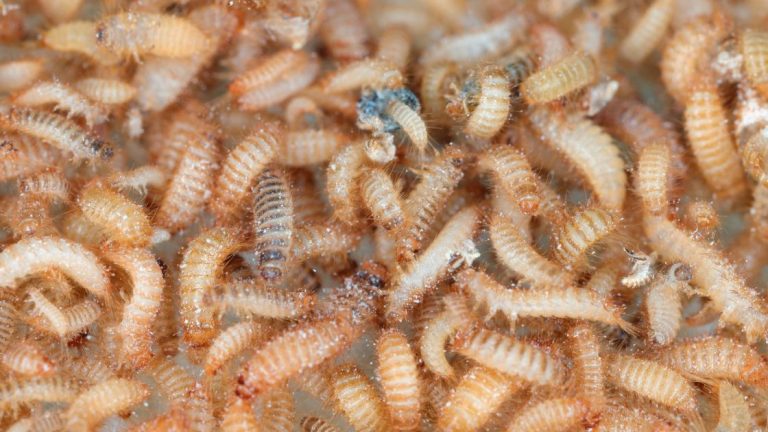
Preventing an Infestation by Cooling or Heating the Grain Mass in Your Bin
We recommend keeping your grain at a regularly low temperature, or below 50 degrees Fahrenheit, to stop insects from invading your grain. This will help in addressing a residual insect problem and slowing down the activity.
The above measure supports an integrated crop program for grain in a storage bin – a plan that also considers each layer of grain, the grain kernels, grain residues, and the whole grain itself.
Grain damage is evidenced by the grain in storage when it exhibits grain debris, broken kernels, grain dust, or webbing within the grain. It may feature live insects, larvae, or insect frass within a grain sample. A musty or sour odor may indicate a problem with stored grain insect pests as well. That’s why we may use one of several approaches to protect the grain on farms and commercial facilities.
For example, because insects are cold-blooded, we may eradicate insect populations by warming the grain mass. The grain mass should be warmed to 120 degrees Fahrenheit for a sustained period when using this approach.
According the insect management news sources, it’s important not to overwarm the grain, as doing so can crack the grain, reducing its quality significantly. For instance, moisture and temperature control are used for getting rid of a maize weevil in stored corn. The insects can’t move or develop in temperatures under 50 degrees Fahrenheit. We suggest managing the temperature by using aeration.
Not only will we check the grain handling equipment and check the entire grain mass temperature of many stored grain bins, but we’ll also apply a safe insecticide to an empty bin after we remove old grain or grain residue. We recommend you thoroughly clean all grain bins first before we apply an insecticide solution.
Why Choose Titan Pest and Wildlife Solutions KC for Your Stored Grain Pest Control Needs?
With several years in the pest control industry, Titan Pest and Wildlife Solutions KC has handled countless stored grain pest issues. Our successful case studies demonstrate our ability to effectively eliminate pests and protect your grain storage. Trust our Missouri pest control professionals to safeguard your investments.
We offer a multi-step approach to pest control. First, we conduct a thorough inspection of your storage areas. Next, we implement prevention strategies to keep pests away. Then, we apply targeted treatments to eliminate any infestations. Finally, we follow up to ensure the problem doesn’t return.
Our team consists of certified pest exterminators who adhere to the highest professional standards in the industry. Each technician undergoes extensive training to stay updated on the latest pest control techniques. You can rely on our experts to provide safe and effective solutions.
At Titan Pest and Wildlife Solutions KC, we prioritize your safety and the environment. We use eco-friendly pest control methods that are safe for your stored grains and the surrounding ecosystem. Our sustainable approaches ensure that your food products remain uncontaminated.
Pest emergencies can happen anytime. That’s why we offer a 24/7 pest service solution to address your urgent needs. Whether you’re in Republic or Rogersville, our prompt and reliable team is ready to respond quickly and effectively to any pest situation.
Preventing an Infestation by Cooling or Heating the Grain Mass in Your Bin
Initial Inspection
We start with a comprehensive pest inspection of your grain storage areas. Our experts will identify any signs of infestations and assess the extent of the problem. This detailed assessment helps us understand your specific needs.
Customized Treatment Plan
We start with a comprehensive pest inspection of your grain storage areas. Our experts will identify any signs of infestations and assess the extent of the problem. This detailed assessment helps us understand your specific needs.
Effective Pest Extermination
Using the latest methods and tools, we carry out safe and efficient pest extermination practices. Our techniques are designed to eliminate pests without harming your stored grains or the environment. We ensure thorough pest removal to protect your food products.
Prevention and Ongoing Monitoring
After extermination, we provide recommendations to prevent future infestations. This step includes routine inspections and treatments as part of our ongoing pest monitoring program. Our prevention plan helps maintain a pest-free environment for your grain storage.
The Importance of Professional Pest Control for Stored Grains
Attempting DIY pest control can be risky and ineffective for stored grain issues. DIY methods may not eliminate all pests, leading to recurring infestations. Additionally, improper use of chemicals can contaminate your grains and pose health hazards.At Titan Pest and Wildlife Solutions KC, we prioritize your safety and the environment. We use eco-friendly pest control methods that are safe for your stored grains and the surrounding ecosystem. Our sustainable approaches ensure that your food products remain uncontaminated.
Choosing professional pest management offers guaranteed results and long-term solutions. Our expert pest solutions provide thorough pest removal and prevention, saving you time and money in the long run. With Titan Pest and Wildlife Solutions KC, you receive reliable and effective pest control tailored to your needs.
Contact Titan Pest and Wildlife Solutions KC Today if You Need to Control Stored Grain Pests
Don’t let pests threaten your stored grains. Protect your food products with the expert pest control services from Titan Pest and Wildlife Solutions KC. Schedule a free consultation today and take the first step toward a pest-free storage facility.
Choose Titan Pest and Wildlife Solutions KC for effective, safe, and environmentally responsible stored grain pest extermination services in Missouri. Protect your investments and ensure the quality of your grains with our professional pest management programs. Phone Titan-356-3021 now.
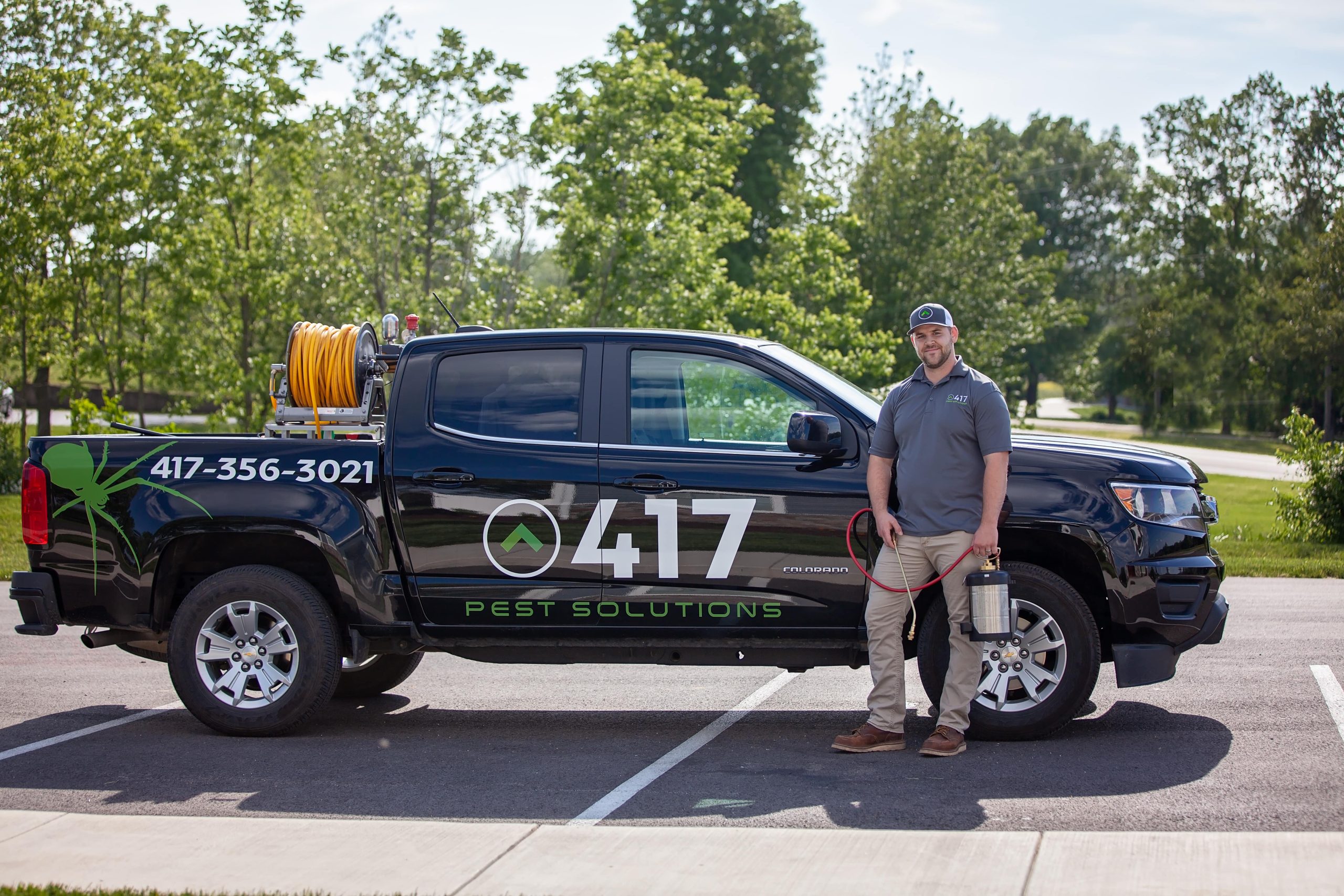
Frequently Asked Questions (FAQ)
Common pests include weevils, beetles, moths, and rodents. These pests can damage grains and contaminate your storage areas. Because they leave dirt and add to the grain weight, we can often identify a problem by assessing the weight alone.
Regular inspections, proper storage practices, and sealing entry points are key to preventing infestations. Our experts can help you implement effective prevention strategies.
Yes, our treatments are eco-friendly and safe for your stored grains. We use methods that protect your food products while eliminating pests.
Regular pest control is recommended to maintain a pest-free environment. We suggest routine inspections and treatments based on your storage needs and pest activity.
Yes, we provide 24/7 emergency pest control services to address urgent grain pest issues promptly and effectively.


